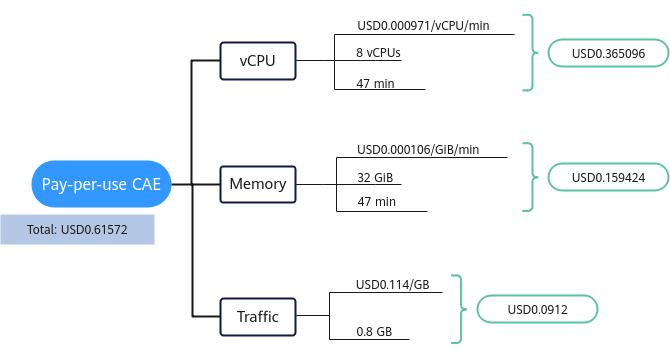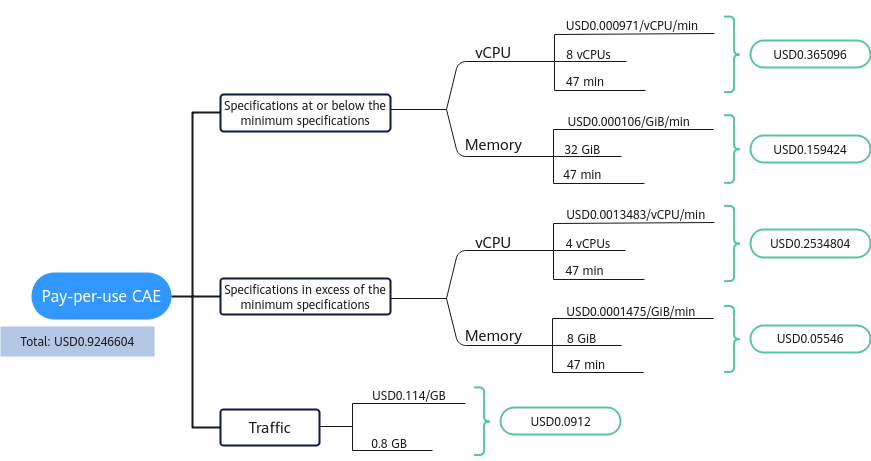Pay-per-Use
Application Scenario
Pay-per-use is a postpaid mode and is useful when application instances do not need to run 24/7, or only for a short period of time.
Billing Items
You are billed for the following items on a pay-per-use basis.
|
Billing Item |
Description |
|---|---|
|
Compute resources |
vCPUs and memory are billed Billing starts only after you create an environment. Fees are calculated in minutes and billed by the hour. |
|
Traffic |
Billed on the amount of public network traffic you use, in GB. |
The price includes:
- vCPU: calculated by your vCPU configuration.
- Memory: calculated by your memory configuration.
- Traffic: calculated by your traffic volume.
Billing Cycle
In pay-per-use mode, fees are calculated in minutes and billed by the hour (GMT+08:00:00). Once settlement is complete, a new billing cycle starts. Billing starts when a CAE instance is created and ends when it is deleted.
For example, if you deployed an application at 08:45:30 to provide services using compute resources (vCPUs and memory) and traffic, and then deleted it at 08:55:00, the billing cycle was from 08:00:00 to 09:00:00 with fees generated from 08:45:30 to 08:55:00. You were billed for 10 minutes.
Billing Example 1
You created an application and configured a 4 vCPU | 8 GiB component at 09:59:30 on Jun 05, 2025, and then deleted the application at 10:45:46 on the same day, using 0.8 GB of traffic data during application running. You were billed for:
- Usage of 1 minute from 09:59:30 to 10:00:00
- Usage of 46 minutes from 10:00:00 to 10:45:46
You were billed for each usage duration. CAE resources are billed individually as described in Table 2. You can choose to display either per-minute or per-hour prices in the pricing details.
Table 2 lists the three types of instance specifications when you use CAE. For details, see Minimum Specifications.
|
Item |
Billing Formula |
Resource Unit Price |
|---|---|---|
|
vCPU |
Instance specification unit price x Instance specifications x Usage duration |
See vCPU prices in CAE Pricing Details. |
|
Memory |
Instance specification unit price x Instance specifications x Usage duration |
See memory prices in CAE Pricing Details. |
|
Traffic |
Actual traffic usage |
See traffic prices in CAE Pricing Details. |
Figure 1 shows how the total price is calculated.

- The prices in the figure are for reference only. The actual calculation is subject to the prices in CAE Pricing Details.
- In this example, the vCPU and memory specifications did not exceed the minimum specifications. So they were billed based on the minimum specifications (8 vCPU | 32 GiB) using the premium unit price.
Billing Example 2
You created an application and configured a 12 vCPU | 40 GiB component at 09:59:30 on Jun 05, 2025, and then deleted the application at 10:45:46 on the same day, using 0.8 GB of traffic data during application running. You were billed for:
- Usage of 1 minute from 09:59:30 to 10:00:00
- Usage of 46 minutes from 10:00:00 to 10:45:46
You were billed for each usage duration. CAE resources are billed individually as described in Table 3. You can choose to display either per-minute or per-hour prices in the pricing details.
Table 3 lists the three types of instance specifications when you use CAE. For details, see Minimum Specifications.
|
Item |
Billing Formula |
Resource Unit Price |
|---|---|---|
|
vCPU |
Instance specification unit price x Instance specifications x Usage duration |
See vCPU prices in CAE Pricing Details. |
|
Memory |
Instance specification unit price x Instance specifications x Usage duration |
See memory prices in CAE Pricing Details. |
|
Traffic |
Actual traffic usage |
See traffic prices in CAE Pricing Details. |
Figure 2 shows how the total price is calculated.

- The prices in the figure are for reference only. The actual calculation is subject to the prices in CAE Pricing Details.
- In this example, the vCPU and memory specifications (12 vCPU | 40 GiB) exceed the minimum specifications. You were billed for:
- Specifications at or below the minimum specifications (8 vCPU | 32 GiB). This portion is billed based on the premium unit price.
- Specifications in excess of the minimum specifications. This portion (4 vCPU | 8 GiB) is billed based on the general unit price.
Price Change After Specification Change
If you change the specifications of a pay-per-use CAE instance, the original order will become invalid and a new order will be placed. You will be billed based on the new specifications.
If you change instance specifications within a given hour, multiple billing records will be generated. The start and end times of each record correspond to when different specifications took effect within the hour.
For example, if you created an application and configured a 4 vCPU | 8 GiB component at 09:00:00 and upgraded to 12 vCPU | 40 GiB at 09:30:00, two billing records would be generated for the period from 09:00:00 and 10:00:00.
- There would be one record for 9:00:00 to 9:29:59, for the original specifications.
- Then there would be a second record for 09:30:00 to 10:00:00, for the new specifications. You would be billed for:
- Specifications at or below the minimum specifications (8 vCPU | 32 GiB). This portion is billed based on the premium unit price.
- Specifications in excess of the minimum specifications. This portion (4 vCPU | 8 GiB) is billed based on the general unit price.
For details about the CAE minimum specifications, see Minimum Specifications.
Impact of Arrears
Figure 3 shows the statuses a pay-per-use CAE resource can go through throughout its lifecycle. After an instance is created, it enters a valid period and runs normally during this period. If your account falls into arrears, the resource enters a grace period and then a retention period.
Arrears Alert
The system will deduct fees for pay-per-use resources at the end of each billing cycle. When your account is in arrears, we will notify the Huawei Cloud account creator by email, SMS, and internal message.
Impact of Arrears
If your account balance is insufficient, your account falls into arrears. However, your pay-per-use resources will not be stopped immediately. There will be a grace period before they are stopped. You are still responsible for expenditures generated during the grace period. You can view the charges on the Billing Center > Overview page and pay any past due balances as needed.
If you do not settle your account balance before the grace period ends, the resource enters a retention period and its status becomes Frozen. You cannot perform any operations while it is in the retention period.
If you do not settle your account balance before the retention period ends, the resource will be released and data cannot be restored.
Feedback
Was this page helpful?
Provide feedbackThank you very much for your feedback. We will continue working to improve the documentation.See the reply and handling status in My Cloud VOC.
For any further questions, feel free to contact us through the chatbot.
Chatbot








